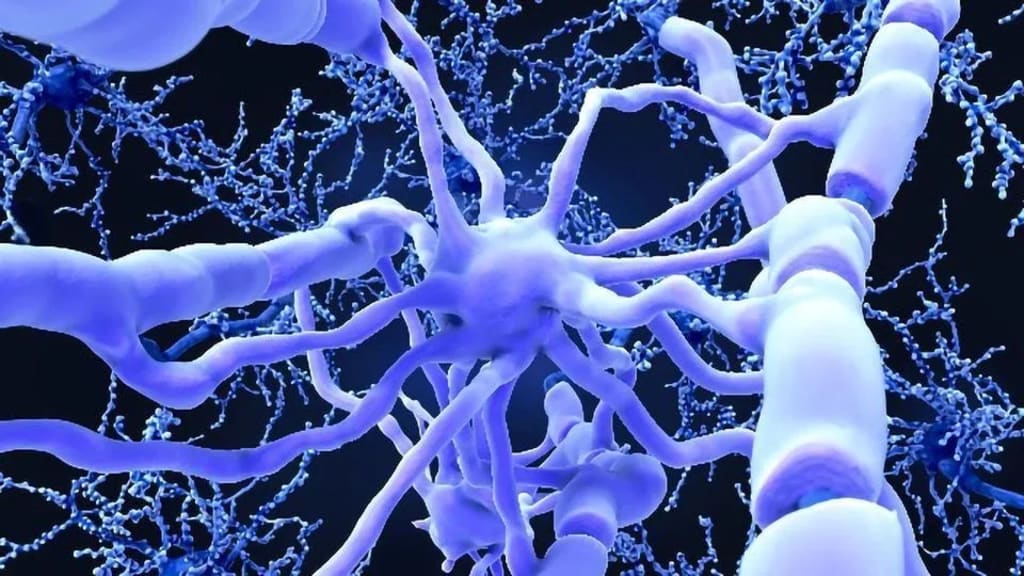Role of Ion Channels and Metabotropic Receptors in Oligodendrogliogenesis: Novel Targets for Demyelinating Pathologies
By Murari Ambati

Introduction
Oligodendrocytes are a specialized type of glial cell responsible for producing myelin, an insulating sheath that wraps around axons in the central nervous system (CNS). Myelination plays a crucial role in facilitating rapid signal conduction and maintaining neuronal integrity. Oligodendrogliogenesis, the process by which oligodendrocytes are generated from precursor cells, is tightly regulated by a complex interplay of molecular signals, including ion channels and metabotropic receptors. Dysregulation of oligodendrogliogenesis can lead to demyelinating pathologies, such as multiple sclerosis (MS), highlighting the importance of understanding the role of ion channels and metabotropic receptors in this process.
Ion Channels in Oligodendrogliogenesis
Ion channels are transmembrane proteins that regulate the flow of ions across cell membranes, playing critical roles in various cellular processes, including proliferation, differentiation, and cell signaling. In oligodendrogliogenesis, ion channels modulate the membrane potential and intracellular calcium levels, essential for regulating oligodendrocyte precursor cell (OPC) proliferation, migration, and differentiation. For example, voltage-gated calcium channels (VGCCs) regulate calcium influx into OPCs, promoting their differentiation into mature oligodendrocytes. Similarly, ATP-sensitive potassium (KATP) channels and inward-rectifying potassium (Kir) channels are involved in OPC proliferation and migration. Dysregulation of ion channel activity can disrupt oligodendrogliogenesis and contribute to demyelinating pathologies. Therefore, targeting ion channels is promising for promoting remyelination and restoring neuronal function in demyelinating diseases.
Metabotropic Receptors in Oligodendrogliogenesis
Metabotropic receptors are cell surface receptors that transduce extracellular signals into intracellular responses through G protein-coupled signaling pathways. In oligodendrogliogenesis, metabotropic receptors play diverse roles in regulating OPC proliferation, differentiation, and myelination. For instance, activation of metabotropic glutamate receptors (mGluRs) promotes OPC proliferation and migration, while activation of gamma-aminobutyric acid type B (GABAB) receptors inhibits OPC differentiation. Additionally, growth factors such as platelet-derived growth factor (PDGF) and fibroblast growth factor (FGF) signal through receptor tyrosine kinases (RTKs), initiating downstream signaling cascades that regulate oligodendrocyte development. Dysregulation of metabotropic receptor signaling pathways can disrupt oligodendrogliogenesis and contribute to demyelinating pathologies, highlighting their potential as therapeutic targets for promoting remyelination in diseases such as MS.
Potential Therapeutic Strategies
Targeting ion channels and metabotropic receptors represents a promising approach for promoting remyelination and restoring neuronal function in demyelinating diseases. Several pharmacological agents that modulate ion channel activity or metabotropic receptor signaling have shown efficacy in preclinical models of MS and other demyelinating pathologies. For example, potassium channel modulators, such as 4-aminopyridine (4-AP), have been investigated for their ability to enhance remyelination and improve neurological function in MS patients. Similarly, agonists or antagonists of metabotropic receptors, such as mGluR agonists or GABAB receptor antagonists, have shown potential for promoting oligodendrocyte differentiation and myelination. Furthermore, emerging gene editing technologies, such as CRISPR-Cas9, offer the possibility of precisely modulating ion channel expression or metabotropic receptor activity in a cell-specific manner, providing new avenues for therapeutic intervention in demyelinating diseases.
Conclusion
Ion channels and metabotropic receptors play critical roles in oligodendrogliogenesis, regulating OPC proliferation, differentiation, and myelination. Dysregulation of these molecular pathways can contribute to demyelinating pathologies, such as MS, highlighting their potential as therapeutic targets for promoting remyelination and restoring neuronal function. Further research into the mechanisms underlying ion channel and metabotropic receptor signaling in oligodendrogliogenesis may lead to the development of novel therapeutic strategies for treating demyelinating diseases and improving patient outcomes.
About the Creator
Enjoyed the story? Support the Creator.
Subscribe for free to receive all their stories in your feed. You could also pledge your support or give them a one-off tip, letting them know you appreciate their work.





Comments
There are no comments for this story
Be the first to respond and start the conversation.